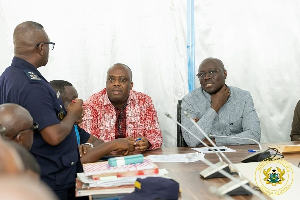Takoradi, April 25, -GNA-A two-day workshop on the use of royalties in mining and oil communities opened in Takoradi on Friday. It was organized by the Coalition on Decentralization made up of three institutions-- The Public Agenda Newspaper, Friends of the Nation (FoN) and the Resource Link Foundation.
Participants included representatives of the media, district assemblies, traditional authorities and Non-Governmental Organizations. In an opening address read for him by Mr. David Yaro, Chief Director of the Western Regional Coordinating Council, Mr. Paul Evans Aidoo, Regional Minister spoke of the responsibilities and functions of Metropolitan, Municipal and District assemblies. He said local people should be mindful of the people they elected to represent them in the assemblies to enable the assemblies to achieve the objectives for which they had been established. Mr. Aidoo said the provisions in the district assembly law do not automatically take effect and they should be a conscious and active effort to implement them.
Mr. Aidoo said provisions in the law could be translated on the ground to spearhead development when there were skilled and competent human resources in the assemblies.
He said in this regard, civil society should be equally interested in those who are elected to serve in the assemblies. Mr. Aidoo said assembly members participate in the preparation of the final budget document of their various assemblies and provided with copies of the budget.
He said therefore, assembly members have the opportunity to monitor the use of resources in their assemblies and to brief the people on the budget.
Mr. Aidoo said if the assembly member for a particular electoral area is not committed enough to carry information from the assembly to his electoral area and vice-versa, it would keep a section of the citizens of the assembly in the dark and for that matter, deprive them of making inputs into the administration of the district. He said personnel of the assemblies play a crucial role in the running of the assemblies and it would do them and the assemblies a lot of good if civil society could engage them from time to time to know exactly what was going on in the offices of the assemblies.
Mr. Aidoo said citizens would be able to call at the district assembly offices to request for information on the programmes and projects and how they were being financed when the Right to Information Bill was passed.
They would also be able to inquire about the income and expenditure pattern of the District Assembly at any point in time, he said.
Mr. Aidoo noted that for such inquiries to elicit right responses, it should be done in good faith adding, "If any impression is created that the public is out to find fault with or witch-hunt the officers at the officers at the District Assembly, it is obvious that their cooperation will not be forthcoming". He said it would also be in order if Churches, Mosques, Traditional Rulers, Associations, Professional Bodies and other social groupings could invite officers of the assemblies for briefing in an "Open forum" where doubts and misconceptions could be cleared and suspicion minimized.
Mr. Aidoo said it would be disastrous if the assemblies failed to attain the quantum of revenue needed for their operations as it would be if the income or revenue available is embezzled or misapplied. He said civil society should not only be interested in ensuring that resources are properly utilized but they should also assist in ensuring that, revenue comes into the assembly coffers, especially the internally generated revenue.
Civil society, Mr Aidoo said, should play an advocacy role for the assembly to ensure that citizens fulfill their tax obligations to give proper meaning to the decentralization policy. Mr. Donkris Mevuta, Executive Director of FoN, said the workshop was to offer the platform to discuss the dynamics of decentralization and solicit inputs to assess transparency and accountability in resource revenue disbursement for local development.
General News of Saturday, 25 April 2009
Source: GNA












